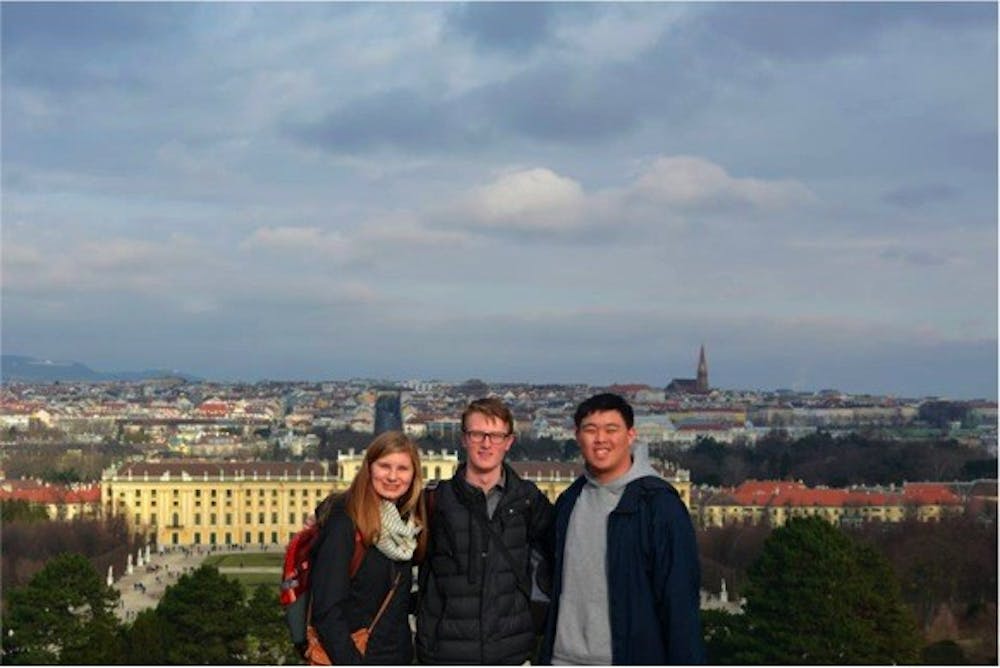The countdown to leaving Europe has begun for students studying abroad in Salzburg. But while students make the most of their remaining days with final weekend trips to bucket list destinations and runs along the Salzach River, administrators and professors involved in the program are already looking toward the future.
This year, for the first time, the Office of Studies Abroad offered fall and spring one-semester Salzburg programs in addition to the yearlong program. This semester, three engineering students joined the 26 full-year Salzburgers, replacing the 10 fall-only students who were primarily from the School of Nursing. The single-semester and full-year combination is set to continue next year with 41 students total each semester. This is a larger-than-usual group, with 32 full-year, nine fall and nine spring students.
Following this year’s success, Salzburg Program Director René Horcicka envisions a variety of opportunities for growth with the innovation to the program.
“The fall semester went very smoothly...It was most interesting for me to see how the integration of the spring term students would work, and that worked out extremely well so I am very optimistic that this [program] is going to be a future potential for more students,” Horcicka said.
In addition to some of the normal program courses, the three spring semester students in Salzburg have been travelling to Wels, Austria once a week to take engineering courses at the University for Applied Sciences Upper Austria (UASUA). This is part of a new exchange program developed between UP and the UASUA, which plans to send three students to UP for next year’s fall semester.
Engineering professors Mark Kennedy and Timothy Doughty visited Salzburg several weeks ago to observe the spring semester program and to work with the UASUA students that will be attending UP in the fall.
“They are going to come in at the junior or senior level so they’ll work on a capstone project here with teams of UP students, and I’ve been helping them pick their project...[UASUA] told me that Portland is their most popular study abroad program in terms of interested students,” Kennedy said.
Kennedy, Doughty and Horcicka, along with Engineering Dean Sharon Jones and others involved in studies abroad, are working to overcome several hurdles involved in jumpstarting a new program.
Austrian universities have two terms: a winter term ending in February, and a summer term running from March to June. This creates a problem for spring semester students who are in Salzburg from January to May.
“Our course schedule [in Salzburg] has become a challenge because the spring one needs to fit with the one in Wels, and still maintain the free Friday,” Horcicka said. “I think if we want to keep it that way, there is either the need to make another classroom [on the Salzburg campus] or to add Friday courses, but I don’t think this is really in the students’ interest.”
A decision has yet to be made regarding scheduling, but Horcicka reports that UASUA has been very flexible and open in the process.
Additionally, the School of Engineering is working with the professors at UASUA to ensure that the spring semester students receive the same quantity and quality of material abroad as they would at UP.
During his time in Austria, Kennedy observed a much more hands-off teaching style at the Austrian university, a sentiment that has been echoed by students, and aims to find a balance between students learning from a different technique but also receiving the help they need. Kennedy also expects to see an increase in the material covered in the UASUA classes in coming years.
“They’re not going at the same pace that we would here, they’re not covering the same breadth of material and I think that’s just because it’s their first time trying to teach a course that’s normally 16 weeks in six weeks,” Kennedy said. “It’s hard to gauge how to do that in five and a half hour lectures one night a week, so we expect that to improve.”
However, the engineering students are feeling supported by staff on the home campus during this trial year.
“There have been lots of professors asking questions and making sure everything’s going well,” spring Salzburger Amy LeBar said. “We meet with [Engineering professor Niki Schulz] twice a week via conference call and go over things that we might not have covered in class in Wels, to make sure that we’re getting the same material that we would be back in Portland.”
So far, no official changes have been made to either the fall or spring programs for next year, but both Horcicka and Kennedy see potential for future growth and developments.








